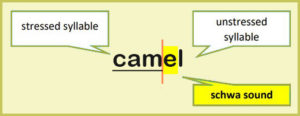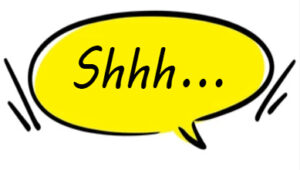
Stressed? Don't be.
Word Stress – Why It Matters
In English, the individual syllables are not pronounced with the same weight. One syllable receives more stress/emphasis that the others. For example, the word ‘confident’ consists of three syllables /con-fi-dent/ and the first one is stressed. Without the word stress the English language would sound rather flat without the necessary rhythm. By putting the stress on the wrong syllable we might even say a word we haven’t intended to because different pronunciation pattern may ‘produce’ different words:
a) pre-sent /noun/ a gift or the time around now
b) pre-sent /verb/ to provide or make something known
Identifying the Syllables
So, first thing first, what is a syllable? To have a good word stress, you must understand what a syllable is. It is a unit within a word that consists of a vowel sound. Remember, however, a syllable is not equal to a letter. The word ‘square‘ consists of six letters (three consonants and three vowels) but when we say the word /skwer/ we say one vowel sound only. Therefore, ‘square’ is a monosyllabic word.
The word ‘ahead’ consists of five letters only but it has two syllables, a-head , /əˈhed/ the first syllable is the ‘schwa’ sound /ə/, which is a short, relaxed vowel sound, almost silent and the following syllable /hed/ is the stressed one.
Sometimes words with the same word stem have different pronunciation pattern. Study the following examples:
- photograph
- photographer
- photographic
What Is a Schwa Sound
To put it simply, the Schwa is a reduced, short and quick vowel sound. Besides, it is the most common sound in spoken English. Its symbol in pronunciation guides looks like this: /ə/ It doesn’t have an exact, standard pronunciation but it is very close to a ‘short u’. It is only found in UNSTRESSED syllables: for example, the first syllable of again/əˈɡen/or the second syllable of teacher /ˈtiː-tʃə(r)/

All English vowels have a Schwa sound, have a look at the chart below:

In some words, the syllable containing the Schwa sound completely disappears, like in cho-co-late, cam-e-ra, in-te-rest or av-a-rage and in the end only two syllables can be heard.
Sentence Stress – Why This Matters Too
When we speak English, we don’t give equal weight to every word. Some words are stressed (we say them more clearly and with more energy), while others are unstressed (quieter and quicker). This rhythm helps English sound natural—and it also helps listeners understand what’s most important.
Why is sentence stress important?
It makes your speech easier to follow.
It shows what you really mean.
It helps avoid misunderstandings.
It brings life and emotion to your words.
In most sentences, content words (nouns, main verbs, adjectives, adverbs) are stressed:
She bought a beautiful jacket in Paris.
Function words (like “a”, “in”, “the”, “and”) are usually unstressed.
How sentence stress changes meaning
Stress can also change the focus or meaning of a sentence—even if the words stay the same:
I didn’t say he stole the money. → Someone else said it.
I didn’t say he stole the money. → I deny saying it.
I didn’t say he stole the money. → Maybe I implied it, but didn’t say it directly.
I didn’t say he stole the money. → Someone else may have done it.
I didn’t say he stole the money. → Maybe he just borrowed it.
I didn’t say he stole the money. → He may have stolen something else.
These small shifts in stress can completely change the message!
How Can I Sound Natural
So far so good, by now you have learned that some parts of a word are more emphasized than the others, but you might ask: how can I do it? A native speaker does it instinctively and naturally, but ESL students have to master the ‘technique’. Here are five things to keep in mind when you pronounce a stressed syllable:
- produce a longer vowel
- say the syllable louder
- raise slightly the pitch of your voice
- pronounce it with clarity
- create a more distinctive facial expression
STRESS ON THE 1st SYLLABLE
TWO-syllable words
e.g. op-en
early
easy
modern
perfect
solid
wooden
silly
pregnant
local
heavy
able
female
TWO-syllable words
e.g. sub-ject
double
narrow
tiny
bloody
equal
silent
anxious
honest
pretty
gentle
decent
bottom
casual
THREE-syllable words
e.g. flex-i-ble
desperate
digital
confident
dominant
various
vertical
horrible
casual
accurate
suitable
typical
generous
wonderful
FOUR-syllable words
e.g. vo-lun-ta-ry
temporary
comfortable
marvellous
comparable
beautifully
STRESS ON THE 2nd SYLLABLE
TWO-syllable words
e.g. pre-sent
permit
digest
succeed
dismiss
agree
arrest
prefer
provide
increase
replace
survive
protect
explain
TWO-syllable words
e.g. per-form
afford
control
apply
exist
behave
remind
invest
defend
destroy
proceed
react
define
insist
THREE-syllable words
e.g. con-si-der
examine
require
encourage
recover
contribute
discover
examine
sufficient
reliable
romantic
consistent
creative
impossible
FOUR-syllable words
e.g. pho-to-gra-pher
traditional
conventional
responsible
inevitable
immediate
presumably
objectively
provocative
autonomous
remarkable
competitive
spectacular
democracy
FIVE-syllable words
extraordinary
unnecessary
uncomfortable
unprecedented
authoritative
STRESS ON THE 3rd SYLLABLE
THREE-syllable words
e.g. re-co-mend
disagree
understand
disapprove
represent
disobey
interrupt
guarantee
entertain
overlook
refugee
engineer
recommend
obsolete
represent
FOUR-syllable words
e.g. ab-so-lu-tely
opportunity
competition
resignation
independent
correspondent
accidental
superstitious
unexpected
revolution
altogether
compensation
documentary
psychological
expectation
FOUR-syllable words
e.g. cor-ress-pond-ence
disappointment
adaptation
visibility
provocation
estimation
miscellaneous
comprehensive
individual
institution
entertainment
contradiction
superficial
disobedient
theoretical
FIVE-syllable words
e.g. an-thro-po-lo-gy
immortality
international
irresponsible
homogeneous
inexperienced
intermediate
paradoxical
underestimate
differentiate
simultaneously
unexpectedly
necessarily
electricity
interchangeable

Silent Letters
If you have come so far, so probably know that English has many words that are pronunced differently from the way the are written. This is partly due to the history of the English language. Lot of words were taken from other languages, such as French (avant-garde, faux-pas, allowance), Latin (foreign, naive, antique) Greek (character, cycle, dialogue, hour, philosophy) , Russian (tzar) etc. Over time, because of the standardization of sounds their pronunciation have changed and refined, while the orginal spelling have been kept.
As you can see from the chart below, almost any letter in the English alphabet can be a sillent one. There are certain rules that can help, such as an ‘a‘ followed by -lly cluster is silent. An ‘L‘ is silent if it is followed by an d/k/m/n or a ‘k‘ is also silent if it is followed by an ‘n‘. Other patterns are more random and difficult to spot.
Silent ‘A’
automatically, aestetically,
romantically, logically
tragically, phisically
musically,
Silent ‘B’
debt, climb, climber, doubt, lamb, comb, thumb, plumber, numb, subtle, tomb, womb, limb, bomb
Silent ‘C’
muscle, scissors, scenario, science, fascinating, scene, descent, ascent, crescent, conscious,
Silent ‘D’
fudge, edge, sandwich, Wednesday, handsome, badge, hedge, grudge, grandson, pledge, fridge, gadget, hundful
Silent ‘E’
camera, vegetable, plaque, breathe, clothes, debate, mate, quite, cane, huge, bite, queue
Silent ‘G’
gnome, sign, champagne, bening, high, campaign, assign, reign, align, foreign, gnat, gnash, cologne,
Silent ‘H’
ghost, character, honest, technology, monarch, ache, echo, mechanism, anarchy, scheme, chemist, knight, psychologist
Silent ‘I/J’
parliament, business
marijuana, mojito
Silent ‘K’
knowledge, knee, knot, knead, knickers, kneel, knight, knob, knuckle,
Silent ‘L’
talk, walk, chalk, half, calm, would, almond, salmon, yolk, calve, stalk, behalf, colonel, palm
Silent ‘N’
autumn, damn, hymn, solemn, condemn, semicolumn, limn,
Silent ‘P’
pseudo, receipt, cupboard, raspberry, pneumonia, psychology, coup, psycopath, pneumatic
Silent ‘T’
ballet, buffet, castle, whistle, fasten, moisten, often, buther, whistle, mortgage, soften, depot, chestnut, nestle,
Silent ‘U’
league, guitar, build, guild, guniea, disguise, circuit, guide, biscuit, guess, vague, tongue, baguette,
Silent ‘W’
wrist, write, wrap, wreck, wrath, whole, wrestle, sword, answer, wrinkle, wrench, wrangle

Connected Speech
Connected speech refers to the natural way native speakers link words together in fluent conversation. Instead of pronouncing each word separately, sounds are blended, reduced, or even dropped to create smooth, effortless speech. For example, “want to” often becomes “wanna,” and “did you” can sound like “didja.”
These changes help English flow more quickly and naturally. Understanding connected speech is essential for becoming an advanced speaker because it improves both your listening and your speaking. When you recognize these patterns, fast speech becomes easier to follow. And when you use them yourself, you sound more confident, fluent, and native-like.
brightonschool.info
© Copyright 2023
® All rights reserved
GRAMMAR
Tenses
Passive
Conditionals
Adjectives
Adverbs
Prepositions
VOCABULARY
Collocations
Word Bank
Phrases
Idioms
Syllable Stress
Common Mistakes
TEST YOUR ENGLISH
Take a Level Test
Test Bank
INFO
About Us
Get in Touch
Disclaimer